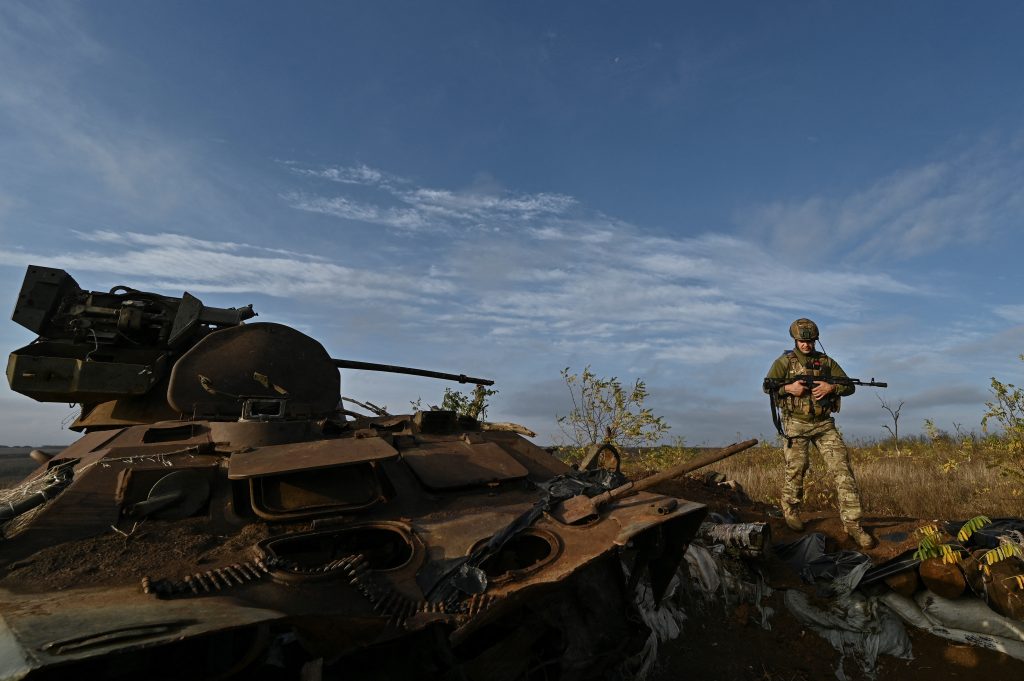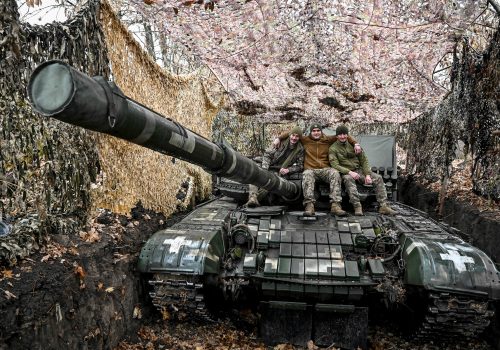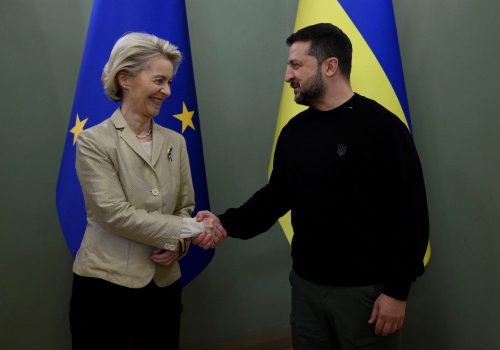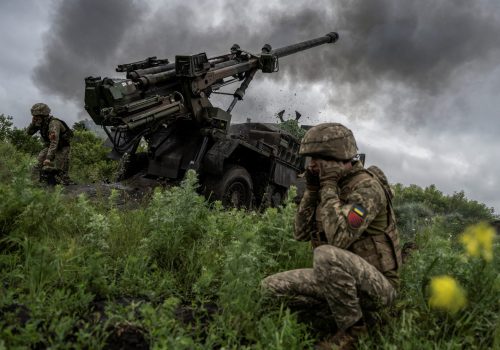As winter arrives, Ukrainian officials are reflecting on the 2023 counteroffensive and attempting to anticipate the next stage of the war with Russia. In Washington, despite a strong bipartisan consensus in favor of continued military support for Ukraine, the House of Representatives has yet to vote on a new aid package following a series of delays.
To unpack recent developments and analyze what impact they will have on the war during the coming year, the Atlantic Council’s Eurasia Center hosted a virtual event in late November featuring an expert panel and moderated by Shelby Magid, deputy director of the Atlantic Council’s Eurasia Center.
As fighting continues in Ukraine into the winter months without any sign of coming breakthroughs on the front lines, some experts argue that the war has now reached a “stalemate.” Shifting front lines, however, are only one indicator of success on the battlefield. In the estimation of retired US General Wesley Clark, former Supreme Allied Commander Europe, “the battlefield is not a stalemate. The battlefield is dynamic.”
One theater where this dynamism has been on stark display is the Black Sea. Alina Frolova, Ukraine’s former deputy minister of defense and current deputy chair of the Center for Defense Strategies, recalled how Ukraine has “fully collapsed” Russian control of blockade operations on the Black Sea, opening up sea corridors through which Ukrainian grain is now able to reach global markets. She also noted that Ukraine had significantly limited Russia’s use of ballistic missiles launched from the sea, which will be especially crucial in countering another Russian wintertime barrage against Ukrainian cities. Frolova pointed out that Ukraine accomplished all this in the Black Sea without even having a navy.
Stay updated
As the world watches the Russian invasion of Ukraine unfold, UkraineAlert delivers the best Atlantic Council expert insight and analysis on Ukraine twice a week directly to your inbox.
Ambassador John Herbst, senior director of the Atlantic Council’s Eurasia Center, noted shortcomings in the military aid being provided to Ukraine. “The Ukrainians were not armed by the United States and its allies in a way that would have made a large success [in the counteroffensive] possible,” he commented. This is a major reason Ukraine’s victories at sea have not been as dramatically replicated on land. “Certainly,” said Herbst, “the Biden administration’s overall policy has been adequate,” but not sufficient to guarantee Ukrainian victory on the battlefield.
Delays in the delivery of certain key advanced weapons such as tanks and long-range missiles have raised broader questions over Western policy toward the war. Ukrainian MP Oleksandra Ustinova reported that while the West delayed decisions and deliveries of military aid, “the Russians used this time to mine all the occupied territories.”
Many commentators believe advances in defense tech will ultimately prove decisive in the current war. Clark emphasized that Ukraine and its partners are “in a very rapid technological race that is affecting every army in the world.” Technology is changing the way countries wage war, and the biggest testing ground for these new strategies, tactics, and systems is Ukraine. In providing future assistance, Frolova noted that Ukraine’s partners might need to revise current military aid policies in line with Ukraine’s changing requirements and broader technological developments on the battlefield.
One priority is localizing Western weapons production in Ukraine, so that Ukrainian industry and Western companies can work together to build, develop, and service the weapons Ukraine needs. With a highly educated and skilled workforce and, as Frolova noted, “plenty of specialists who can easily join up and multiply production many times,” Ukraine can play an integral role in the production and maintenance of Western weapons.
Many Western defense companies understand these opportunities and some have even begun investing in Ukraine. For example, German company Rheinmetall has launched a joint venture in Ukraine. “We have big capacity to produce our own weapons,” said Ustinova. However, she noted that US arms manufacturers currently face significant restrictions. Given greater flexibility to invest, Western defense companies can make Ukraine an integral part of their supply chains.
Eurasia Center events

In conjunction with specific policy changes, continued assistance from the US and its allies is crucial. In Washington, progress on aid has been stalled due to delays in Congress. In October 2023, US President Joe Biden proposed a package that would pair aid to Israel, Ukraine, and funding for the US border. Despite bipartisan support in Congress for Ukraine and Congressional leadership’s public commitments to hold a vote on aid, Herbst noted that “a very small group in the House” is holding assistance hostage.
Clark expressed concern about the flow of assistance to Ukraine from the United States, both in terms of financial support and military equipment, noting that both components are vital to maintain Ukraine’s ability to resist Russian aggression. This assistance is an investment not just in Ukraine’s security, but in the security of the United States and its partners, he noted. Herbst reminded the audience that if Putin succeeds in subjugating Ukraine, “Russia is coming for NATO.”
Despite political obstacles, Herbst underlined that American public support for Ukraine remains robust. The current delay in Congress, however, not only threatens Ukraine’s ability to defend itself and make progress on the battlefield, but also calls US commitments around the globe into question. Ustinova noted that “China, Iran and other autocracies are watching” the foot-dragging in Washington, which only emboldens authoritarian leaders.
How will the Russia-Ukraine War develop in 2024? General Clark noted that the decisive moment in this war could come “at any point, either through leadership failure, lack of logistics support, technological breakthrough, or failure of political will.” By strengthening their commitment to Ukraine at this critical turning point, Western leaders can help ensure that when that breakthrough comes, it will be in Ukraine’s favor.
Benton Coblentz is a program assistant at the Atlantic Council’s Eurasia Center.
Further reading
The views expressed in UkraineAlert are solely those of the authors and do not necessarily reflect the views of the Atlantic Council, its staff, or its supporters.

The Eurasia Center’s mission is to enhance transatlantic cooperation in promoting stability, democratic values and prosperity in Eurasia, from Eastern Europe and Turkey in the West to the Caucasus, Russia and Central Asia in the East.
Follow us on social media
and support our work
Image: A Ukrainian serviceman inspects a destroyed Russian BTR-82A armoured personnel carrier outside the village of Robotyne, amid Russia's attack on Ukraine, near a front line in Zaporizhzhia region, Ukraine November 4, 2023. (REUTERS/Stringer)




